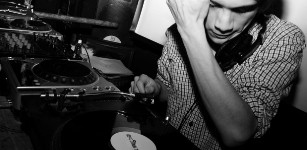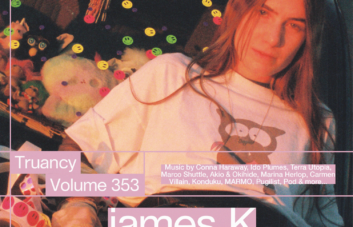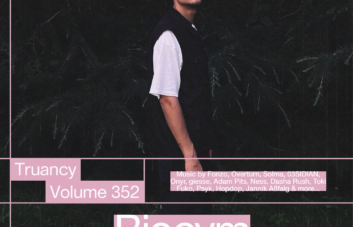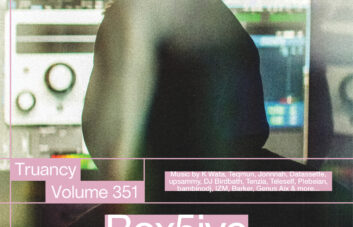TJ Hertz has become one of the most admired artists of the year under his moniker Objekt, after the release of his first white label in January; two delectable slabs of techno-infused dubstep – wild, gurgling progressive works that build and grow from the simplest sounds to points of unimaginable intensity. This was furthered with the arrival of Objekt #2, carrying “Unglued” and “CLK Recovery”. Where DJing fits in with his musical persona it’s not the end result of the urge to create; the other half of his life is as a software developer for Native Instruments. The technical know-how that comes from an inquisitive childhood, a degree in electronic engineering and working in that profession has gone some way to lighting the path towards music production. As well as the ecstatically received white label releases, the forthcoming Staircase EP by Call Super on Five Easy Pieces features an Objekt remix of “Timora”, and there’s a lot more to come – we found out for you and had a little chat with TJ.
The name Objekt is both ironic and perfectly appropriate, given the transient, intangible nature of music in itself, and also the very tangible nature of the 12″s themselves – nowadays, to many people the idea of owning a physical copy of the music they listen to is a bit ridiculous as well. Was the name a deliberate choice? TJ: It’s not meant to be a statement. I do like how it fits in with the idea of releasing a limited number of physical copies, but I didn’t really think much further than “What can I stamp on a record that sounds kind of cool?”. If people find the idea of owning a physical copy of a recording ridiculous – that’s pretty sad, if true. Fifteen years ago you didn’t ‘have’ recordings without a physical embodiment. I suppose I’m effectively making music for DJs though, rather than end consumers. A few years ago you could still find some “dance” singles in high-street shops, now you’d never get a CD single and finding a 12″ is a rarity for the most part. There was a time when the small HMVs in small town centres actually sold music. Can you imagine? A lot of the smaller ones just sell DVDs and video games now. Calendars. That kind of thing.
With you being an expert on a technical level as well as on the musical side, how do these two sides feed off and inform each other when it comes to making music? I guess it’s a bit like having some knowledge of the rules and technicalities of a language, as opposed to learning by immersion. I tend to visualise signals and processes – effects and EQ etc – a lot, because I make audio algorithms for a living. To me, that’s really helpful and enlightening; to some people that might be of no benefit at all. It just depends how you like to approach things. The technical knowledge also gives you a head start in knowing what definitely won’t work, without having to spend as much time trying things out. Would you say you skip the trial and the error part? Not entirely, but the process is a bit more efficient, yeah. Well, the learning process, as opposed to the production process.
In the length of “CLK Recovery“ you managed to touch on a range of different genres, but it doesn’t sound like a random amalgamation. How do you think it is that you can combine these different sounds so successfully? To me it’s just solid techno the entire way through. The original idea was for it to be much rawer and much trackier, like really early Surgeon or something. In my head it was a super-thin kick drum with all of these sporadic arpeggiated chords coming out of nowhere every few bars – not following your standard 4/8/16/32 bar template – and occasionally the kick would drop down and kick you in the chest for a minute and then come up again. Essentially a DJ tool – I tried that and got a bit bored with it, hence all the different sections. But the underlying aim was always to make a big warehouse techno track, that’s all. I started it on Christmas Day and it was mostly done by the end of January. Then I tweaked it for another month or so. I do work fairly gradually and definitely feel uncomfortable calling something finished until I’m a hundred percent sure there’s nothing else I can tweak. I guess attention to detail is one way of putting it.
Some of your tracks could be described as “slow burners”, referring to length and progression – do you make music with the club in mind, or is it just about what sounds best to you then and there? I guess it depends what angle you come from – they’re slow-burning by London standards, sure. But most of the tracks I’ve released so far… I actually think they have a kind of pop sensibility to them. Structurally, anyway. “The Goose That Got Away” originally started out as a three-minute pop song, didn’t it? Yes, it was three minutes long because there was a three-minute time limit in the sample pack competition I was entering it into, haha. Actually, it’s almost identical to the original. It’s just a bit more dancefloor-friendly. The whole thing started out as a pastiche. It was like, okay, I’ve got three minutes, what can I possibly say that isn’t really banale? One of the samples was a cheesy garage drum loop so I cut it up and wrote a 2-step pop tune. That’s what it felt like to me. At the time I’d been mostly trying to be some super-serious deep techno maestro and that wasn’t really going so well.
OBJEKT001A :: The Goose That Got Away by Objekt
When it comes to “DJs” and “the dancefloor” and that – how much do you go clubbing, and how much does that inform what you make? A fair bit. At the very least it’s helpful to have a good idea of how your shit translates to big soundsystems, but that’s the least of it really. I think if I didn’t DJ I’d be in a much weaker position of being able to evaluate what works and what doesn’t. Then again, the drop on the B-side of Objekt #2 is in 5/4 and practically beatless, so I guess you could argue that I have a skewed perspective on what “works”.
What kick-started the DJing as opposed to producing? Or were the two linked? I started DJing when I stopped playing in bands. I’d done that solidly throughout my teens and eventually sussed – like many before me – that DJs got to play music they liked to a crowd who wanted to have fun, whereas unsigned bands played music they were sick of to a small crowd of people they’d dragged along themselves, who almost invariably didn’t really want to be there. How has the DJing tied in with your day job? With some difficulty. At the moment, I play out a couple of times a month, mostly outside Germany, but that’s only been since Objekt #1 came out. I hardly ever play in Berlin, not “proper” gigs anyway. I hardly played out at all for the first two years I lived in Berlin though. The bookings have been quite a recent development. The idea of being a full-time DJ doesn’t really appeal to me that much at the moment. I enjoy playing out but I can’t see myself dedicating my life to getting on one plane after another. I like that there’s a little bit of tension between the two halves of my life. Do your colleagues know what you do outside the office? Yeah, some of them, but I’m far from the only one.There’s quite a few people working here who are fairly well-known in various musical circles. Emika, Bill Youngman, Mri, Tim Exile does some freelance Reaktor development, Errorsmith made Razor pretty recently.. Most of them are part-time or freelancers though.
How do you react to the way journalists try to categorise your music in whatever way they can, sometimes by attributing your style to that of other artists? It’s no insult to me – labelling music is what music journalists do. How many albums came out in 2010 that truly defied classification according to existing works… and were also aimed at the dance floor? Touché, however it might imply that one is copying the other. I don’t think there’s necessarily anything wrong with it. People need their points of reference. In any case, it’s pretty bold of any artist to suggest that their music can’t be compared to anything that’s come before. Okay, so genre-ising has got a little out of hand, but that’s slightly different. Saying “this sounds a bit like Artist X” isn’t the same as trying to classify it.
Timora (Objekt rework) by Five Easy Pieces
Can you tell us a little bit about your Call Super remix? Call Super is JR Seaton and Matt Waites, and Joe (Seaton) is a close friend of mine. We moved to Berlin around the same time and have been bouncing music off each other since then, though we’ve never actually collaborated. I’m looking forward to that coming out. The Call Super tracks are great – really organic and honest sounding, very melodic. Quite housey, apart from “Timora” (the one I remixed). I think the vinyl’s gonna look great as well; the label (Five Easy Pieces) have done a great job with the artwork and manufacturing. It’s run by a guy called Claudio, who does the bookings at the CAMP in London. He’s a close friend of Joe’s and a super nice guy. The whole thing is basically the project of a bunch of friends, which is really nice. That sounds like a real labour of love. Yeah, and ultimately you’re talking about pressing a few records that’ll never make you much (if any) money and putting yourself through a load of hassle as it is – so why not make the experience as pleasant as possible? That came out kind of wrong… I mean, it’s nice to work with friends when you can.
And could you reveal anything else about upcoming projects? I’ve just finished a remix for SBTRKT which should be out on Young Turks in June, hopefully. The original is a very stripped back, quite cheeky little pop song. 808, bassline, a synth or two, Yukumi from Little Dragon doing the vocals. My remix is a pretty banging breakbeat techno track which didn’t really keep much of the original apart from the vocal. We’re also doing a small run of white labels with Dub and DJ Tool mixes for the techno heads (no vocals, more drums). You’ll have to heard it really. There’s a Hessle Audio release in the pipeline after the summer, albeit not yet confirmed, and I’ll be doing a release on Man Make Music as well, a new label set up by the guys who run the parties in London. I’ve had various offers from a few labels I’d really love to work with but right now I can’t really say much more than that. •





Nice interview thanks… and two great releases from Objekt !
hi!:)
we are listening to your music!